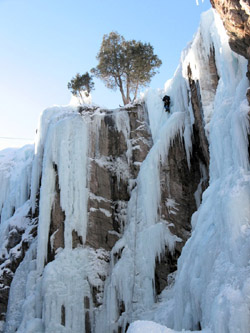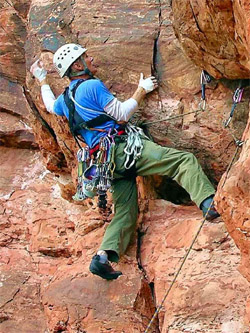 CW Ice at Ouray 2007 |
 Birdland at Red Rocks 2007 |
|
Charlie Winger Questionnaire 1. Year of birth: I
started rock climbing in 1976. I never had a
bodyweight routine and didn’t
participate much in school athletics.
I retired about 5 years ago from a career in software development. Had my own company for about 30 years. A couple of years ago my wife and I wrote “The Trad Guide to Joshua Tree”. 6. How important is the social aspect of the sport for you?: I
enjoy the camaraderie I find when climbing (and talking about climbing)
with my
friends. The
stories always get better
with time.
Section B.
1. Type of rock climbing (or bodyweight athletics) you now enjoy: I primarily do traditional routes with a few sport routes thrown in here and there. I’ve tried bouldering but due to a bad back can’t deal with peeling off the routes. Younger
in my case was when I was 40 years old.
Not many sport routes (bolted climbs) were around in
those days. My
younger climbing adventures were mostly
limited to the Flatirons and
My
main passion is mountaineering.
I
leverage mountaineering activities with rock and ice climbing as well
as doing
extensive hiking. I
ice climbed 50 days
last season. Also,
I get on the bicycle
when possible for some shorter rides.
I currently exercise about 4
days a week. Before I was 65 I didn’t
exercise as much
although I did manage to put together
a couple of international climbing expeditions each year for several
years. These were always preceded by many weekends
of “getting into shape”.
Usually
my climbing/exercise sessions last most of the day.
Had a 20 mile, 6,000’ hiking day a couple
of
weeks ago. Last
week I was at City of
Do
you ever completely recover at our age?
I attempt to build in some “off”
days during more extensive exercise
sessions. I
found that this past summer
I “bottomed out” on the recovery trail. My legs were
sore for about a week or so. I
had just finished a couple of months of
nearly continuous hiking and climbing activities with three different
sets of
climbing partners. I
also have to be
careful during ice climbing season as it isn’t unusual to
climb on seven
consecutive days with different partners.
My
climbing ability current and prior is mainly limited to routes in the
5.6 to
5.8 level. Every
once in a while I sneak
up on a 5.9. This
works for me as I
mentioned earlier, rock climbing is a means to an end and not an end in
itself. I think gym
climbing facilities have made for
a stronger group of climbers today than was around 30 years ago. They usually
don’t bother with climbs at my
level of ability.
No
one every accused me of being an “animal” in the
strength department. I’ve
noticed that I’ve been getting less
strong over the past few years.
I
suspect that I could partially reverse that trend with regular strength
exercises. There’s
always tomorrow!
Section C.
1. Any injuries or illnesses since age 65 affecting your climbing/exercising?: How have you coped? NSAIDs or other medication? I’ve
been in excellent health since turning 65 and have avoided any injuries. I suspect this is in part
due to my ongoing
level of continuous activity. I’ll
take
a couple of Ibuprofen tablets at the end of the day if my body feels
extra
sore. If I intend
to go out and have a
hard day I may take a couple of tables proactively.
I
am not a vegetarian but don’t eat a lot of red meat. I eat plenty of fruits and
vegetables as well
as fish. I
don’t take any stimulants.
3. Special food or drink after a workout?: I
don’t have any special food after a workout. I will usually
try to drink
something like Accelerade® or Gatorade® at the end of
my exercise period.
I
consciously attempt to maintain a high fluid intake with various sports
drinks
usually diluted with water.
Section D.
1. What is your current philosophy of your sport? Has this changed with age? I enjoy getting out and exercising for the pure pleasure of whatever event I’m currently doing. Perhaps that means I’m not as competitive as I used to be. I think that now I’m exercising more for me and to maintain good health rather than to try to achieve a certain level of ability. The “rewards” are feeling good after having done something enjoyable 3. What is your opinion: Is rock climbing (bodyweight exercises) performance – at any age - influenced more strongly by genetic attributes or training and experience? (Nature or nurture?) Is it even possible to generalize?: Whew,
now that’s a tough question!
I’ve got to
believe that in my case my performance is influenced more strongly by
genetic
attributes than by training, but without training would I be able to
take
advantage of my genetic attributes?
Sounds like a recursive answer to me. I guess you have to have
something to start with (genetics) before
training can be beneficial.
Perhaps a
good mental attitude is one of the most important factors which affects
performance.
4. What are your predictions for the future of rock climbing?: Unfortunately,
more regulation and restriction. The
popularity of the sport is its own worst enemy.
Now, land owners and governmental regulatory
agencies are slowly drawing the noose around our collective necks.
They seem to ignore constructive input on the part
of climber’s
collations and arbitrarily implement what I think are not well thought
out
rules and regulations.
|
Return to Introduction